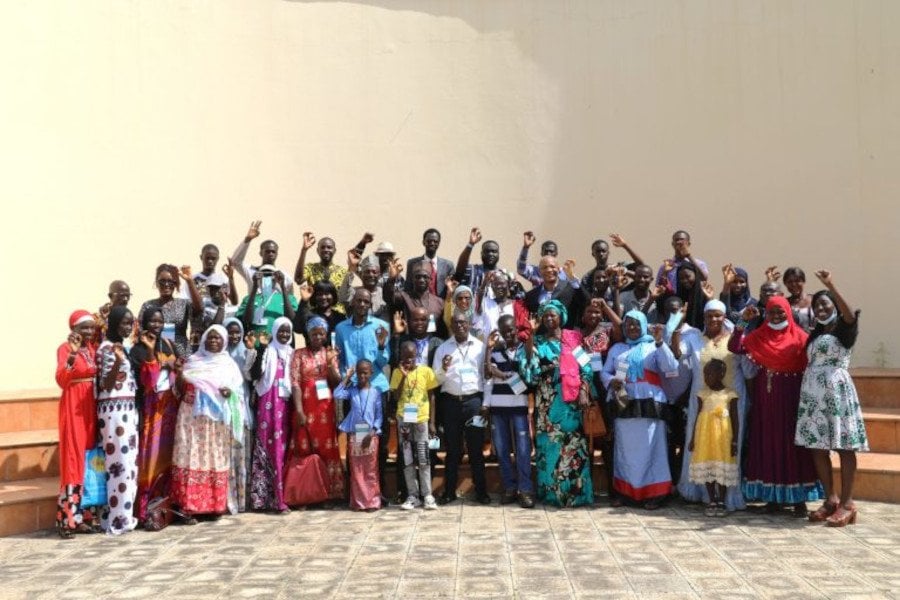
Credit: Mamud Joof/MRCG at LSHTM
The Medical Research Council Unit The Gambia at the London School of Hygiene & Tropical Medicine (MRCG at LSHTM) convened a 3-day participatory workshop from 17th to 19th November 2021, at the Ocean Bay Hotel in Bakau. The meeting brought together research staff from the Unit, former Tuberculosis (TB) patients, TB-affected families, TB advocacy organisations, and selected policymakers from across West Africa.
Through this engagement, the Unit sought to gain insights into the experiences of former TB patients and TB survivors on household-incurred costs and strategies adopted for coping with persistent health impairments due to TB. Funded by the UK Research and Innovation-Global Challenges Research Fund, this participatory workshop follows an intensive practical training on paediatric spirometry for healthcare workers from six West African countries that took place at the MRCG at LSHTM in October 2021.
Dr Toyin Togun, the Principal Investigator of the GCRF Challenge Cluster for post-TB lung health in children in West Africa said, “TB is a social disease, and it impacts on the entire family of a TB patient. A patient-centred approach has now been adopted for the care of individuals affected by TB, with the family at the centre of such an approach. In this project, we have established an inter-disciplinary platform that we will leverage in generating unique clinical, epidemiological, basic, and social science data on the topical but grossly under-researched topic of post-TB lung health across the life course in West Africa. Our multi-country presence will make the data generalisable, while the close collaboration with the network of civil society/TB advocacy organisations and policy makers across the sub-region will promote the uptake of our research findings into policy to pragmatically improve the care of TB patients even after completing TB treatment.”
Dr. Sharmila Jah, the National Professional Officer at the World Health Organization (WHO), Gambia Office said, “The workshop is important because it brings together TB patients, programme staff, researchers, and policy makers in one forum. Exchanging ideas and hearing patients discuss the impact of TB on their lives is important.”
Dr. Jah added that The Gambia has a strategy which aligns with the global strategy to end TB by 2030. She concluded that it is important for all the partners to work together and support the Ministry of Health to implement that strategy.
In 2020, there were an estimated 10 million new cases of tuberculosis (TB) disease globally, and 1.5 million people died from TB. This makes TB one of the major causes of death by a single infectious agent worldwide. While global TB reports are based on estimates of patients who die either before or during TB treatment, there is now a growing body of evidence from studies conducted exclusively in adults suggesting that patients cured or successfully treated for TB have persistent health impairment, and a relatively higher morbidity and mortality after treatment, than the general population.
The Challenge Cluster brings together two multi-country collaborative projects, supported by MRC-GCRF Foundation Awards, with specific expertise in childhood TB and lung health in Africa. The GCRF-funded partners are linked with partners in national TB programs from across Africa and members of the TB-affected communities, underpinned by key regional and international collaborative research and advocacy networks, including the Pan African Thoracic Society (PATS), International Union Against TB and Lung Disease, West African Paediatric TB Network (WApTBNet) – a sub-network within the West African Network of Excellence for TB, AIDS and Malaria (EDCTP- WANETAM), and TB Proof – a global TB advocacy organisation in South Africa.
If you enjoyed this article and would like to build a career in global health, we offer a range of MSc programmes covering health and data, infectious and tropical diseases, population health, and public health and policy.
Available on campus or online, including flexible study that works around your work and home life, be part of a global community at the UK's no.1 public health university.
